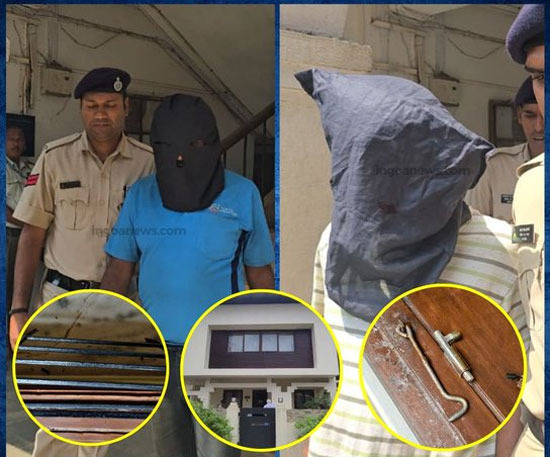Daijiworld Media Network - Panaji
Panaji, Nov 23: Goa, long known for its high crime detection rate, is facing an unprecedented surge in violent robberies that has shaken public confidence in the State’s policing. In the past eight months, a series of armed break-ins, three major dacoities, and multiple burglaries have exposed serious lapses in preventive policing and raised alarming questions about residents’ safety inside their own homes.
Police sources admit the State has not witnessed crimes of this nature in nearly 25 years. What makes the situation more troubling is the suspected involvement of Bangladeshi criminal gangs, whose precision-driven operations have taken the Goan police system by surprise.

A New Modus Operandi
Investigations into the dacoities at the Dempo residence in Dona Paula and the Ghanekar bungalow in Ganeshpuri, Mapusa, point to a four-member Bangladeshi gang. Officers say these gangs do not personally conduct recce of the targeted neighbourhoods. Instead, they rely on associates already living in Goa to gather details of occupants and identify vulnerable homes. These aides also provide shelter to the gang before and after the crime.
The Dona Paula Break-In
One of the most shocking incidents occurred in April 2025, when three armed robbers stormed into the Dona Paula home of elderly couple Jaiprakash and Padmini Dempo. They overpowered the security guard, tied the couple to their bed and ransacked the house.
Nearly six months later, the police managed to arrest only one person—46-year-old Mahmood Ali of Uttar Pradesh, now residing in Calangute. Police allege he helped the gang identify the house and gave them shelter. Ali already faces an Arms Act case in Vasco. None of the main accused have been traced.
The Ganeshpuri Strike
In the Mapusa case, police arrested two men — Raju B of Uttar Pradesh and Safikul alias Sagikul of Karnataka — for their role in the dacoity at the residence of Dr. Mahendra Ghanekar. The suspected Bangladeshi masterminds, however, remain untraced.
The police told the Court that several accused are Bangladeshi nationals staying illegally in India. The defence argued that there is “nothing on record” to prove illegal stay.
A Gang That Leaves No Digital Footprint
Sources describe the gang’s style as disturbingly sophisticated. The criminals avoid mobile phones or electronic devices, leaving no digital trace.
“They operate through human intelligence while we rely excessively on electronic data — that’s the gap they exploit,” a senior official said.
They reportedly plan their escape routes in advance, coordinate in person, and discard weapons soon after the crime to avoid suspicion at police checkpoints.
Though not known to harm occupants unnecessarily, police say their restraint is conditional. In the Ganeshpuri case, the gang even asked the doctor’s elderly mother to make them tea and helped themselves to food before fleeing.
Escape Across Borders
By the time police connected the dots, the gang had already crossed international borders.
“We have no actionable material to approach the counterpart government given the internal situation and treaty conditions. Arrest is possible only if they re-enter India,” a source said.
Systemic Lapses and a Wider Threat
Officials warn the pattern mirrors similar strikes in Kashmir, Andhra Pradesh, Karnataka and Maharashtra — suggesting an organised network of infiltrators targeting affluent, low-security homes across India.
The government has directed the police to conduct a comprehensive review of all dacoities this year and coordinate with other States. Meanwhile, the Baina robbery and St Cruz theft remain unsolved.
Porous Borders Enable Infiltration
Police say infiltration from Bangladesh continues due to porous border stretches.
“Of the 4,000 km border we share with Bangladesh, nearly 1,000 to 1,500 km are porous,” a senior officer said.
Infiltrators disperse across multiple states, with some joining organised crime networks.
Police also noted that these gangs move swiftly between states after every offence, exploiting gaps in inter-state coordination and border checks.
As Goa grapples with this new wave of organised cross-border crime, the police face the critical task of rebuilding ground intelligence and strengthening coordination to prevent further strikes.